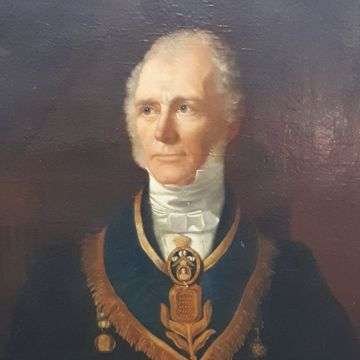News
C19th portrait of Leicester Grand Master Freemason, politician and baronet in Lichfield auction
November 4th, 2022
C19th portrait of Leicester Grand Master Freemason, politician and baronet in Lichfield auction
A ‘COMMANDING’ portrait of a leading Freemason, baronet and politician who was a much-loved public figure across Leicestershire is coming up for auction.Few images are known to exist of Sir Frederick Gustavus Fowke, of Lowesby Hall near Leicester, whose family enjoyed close connections with the Royal Court.
He served as masonic Deputy Provincial Grand Master for Leicestershire from 1833 to 1851 and became Provincial Grand Master from 1851 to 1856 – the year he died aged 74.
Sir Frederick was also Senior Grand Warden for the United Grand Lodge of England in 1821.
The unsigned oil painting depicts the baronet in his later years wearing full masonic regalia, with a white glove on one hand and the other resting on a gavel.
The work goes under the hammer with Richard Winterton Auctioneers at The Lichfield Auction Centre, Wood End Lane, Fradley Park, on Tuesday, November 15, from 9.30am, estimated at £1,500 to £1,800.
The mid-19th century British School oil painting measures 125cm x 99cm and sits in an imposing gilt frame 1.6m tall.
“The painting is in need of some restoration but it remains a commanding portrait of an important figure in 19th century Freemasonry both in Leicestershire and the wider area,” said Sarah Williams, senior valuer at Richard Winterton Auctioneers.
“An earlier portrait of the sitter from the 1820s by an unknown artist is held at the Museum of Freemasonry in London.
“The 1820s portrait is said to be a copy of the original in Freemasons Hall, Leicester.
“Some three decades apart, the older Sir Frederick is clearly recognisable from his portrait as a younger man and warmth, humour and kindness can be seen in his eyes.”
Viewing of the painting at The Lichfield Auction Centre is by appointment on Friday, November, from 10am-4pm.
To book, or for more auction information and valuation enquiries, call 01543 251081 or email office@richardwinterton.co.uk.
Sir Frederick Gustavus Fowke
Born in 1782, Sir Frederick’s grandfather was Lieutenant-General Thomas Fowke, governor of Gibraltar, and his father was Lieutenant-General Sir Thomas Fowke, groom of the bedchamber to Frederick, Duke of Cumberland, the brother of George III.It was that association which led Sir Thomas to name his first son in the honour of his royal patron.
The 1st Baronet of Lowesby Hall – a title created for Sir Frederick in 1814, the year he married aged 32 – was from an old Leicestershire military family with other prominent Freemasons including Colonel Sir Thomas Fowke, the first Provincial Grand Master of Leicestershire, and Sir John Fowke Lancelot Rolleston JP, a prominent 19th century Leicestershire Freemason.
Sir Frederick became ‘an active and zealous politician’ whose views were ‘liberalised’ by ‘time and experience’, according to obituary published in the Leicester Chronicle on May 31 1856.
He also performed ‘deeds of public justice… conscientiously and unostentatiously’ and carried out ‘many acts of personal kindness’.
“To the brethren of the mystic tie
 The portrait of Sir Frederick Gustavus Fowke in his later years shows his eyes shining with warmth and kindness.
The portrait of Sir Frederick Gustavus Fowke in his later years shows his eyes shining with warmth and kindness.The report also sheds light on Sir Frederick’s idyllic early life – ‘his entry into life was made with every augury of auspicious promise’ – and close ties to the Prince Regent, who apparently dubbed him ‘Fred Fun’.
“He lived too in an atmosphere of daily revelry for when he was yet a boy he was brought into frequent contact with the Prince Regent and his royal brothers,” it reads.
“Naturally generous and social possessing more than a fair share of talents and accomplishments; a humourist; a mimic; a ready rhymester; handsome in face; in person affable courteous; and prepossessing in demeanour – young Frederick Fowke must have been a universal favourite.
“His sobriquet of ‘Fred Fun’ – received from the Regent we are told – best expresses the idea his associates then formed of his character.”
Shades of the early influence of the Prince Regent perhaps surfaced when Sir Frederick arranged a ‘splendid’ fete at Lowesby Hall on September 18 1818 to mark the christening of his two sons.
“The fete was honoured by the presence of the Duke of Rutland and of members of the leading county families,” the obituary recounts.
“Magnificent apartments were constructed expressly for the accommodation of the visitors and a princely liberality was evidenced in all the arrangements upwards of 400 persons sat down to supper.
“Lowesby is said indeed to have resembled one of the gorgeous scenes of Oriental fiction on this memorable occasion; but it is to be lamented that its effects on the worthy baronet’s fortune were serious and prolonged in their continuance.”
Sir Frederick was survived by Mary, Lady Fowke, their four sons and two daughters.
